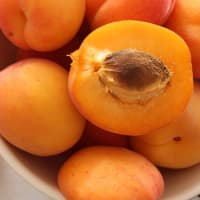Apricot is a fruit of several species in the genus Prunus (stone fruits).
Species & Cultivars
Prunus armeniaca
Prunus armeniaca means Armenian plum. Also called ansu apricot, Siberian apricot, and Tibetan apricot.
Prunus armeniaca is one of the most important Mediterranean fruits.[1]
It is also the most commonly cultivated apricot species.
Prunus Armeniaca ‘Goldrich’ is a cultivar with high polyphenol content.[1:1]
Prunus mandshurica
Also called Manchurian apricot and scout apricot.
A variety of the Siberian apricot (Tibetan apricot) Prunus armeniaca.
Native to northeast China, Korea, and Manchuria.
The Manchurian apricot has high levels of the polyphenol Phloretin.[2]
Prunus brigantina
Prunus mume
Prunus zhengheensis
Prunus sibirica
Composition
The concentration of polyphenols in apricot peel is 10 fold higher than flesh.[1:2]
Healing Properties
Antiinflammatory
Antioxidant
Antitumor (anticancer)
Heart Health
Antihypertensive
Vasorelaxation
Phloretin, a polyphenol found in apricots, has the effect of regulating vascular tone. It has been specifically shown to inhibit arterial vasocontriction.[2:1] This means that it can promote a reduction in tension of the blood vessel walls.[2:2]
Phloretin is an auxiliary mechanism for relaxing the arteries, besides typical stimulation of the endothelium.[2:3]
Phloretin actually inhibits the contractions of arteries by acting directly on the smooth muscle (not just the endothelium), therefore this can have a beneficical therapeutic effect on individuals with diseased enothelium (such as with atherosclerosis or diabetes).[2:4]
Disease / Symptom Treatment
Cerebrovascular Disease
Refer to the section(s) above for Antihypertensive, Vasorelaxation
Heart Disease
Refer to the section(s) above for Antihypertensive, Vasorelaxation
High Blood Pressure (hypertension)
Refer to the section(s) above for Antihypertensive, Vasorelaxation
Adverse Affects
Synergistic Effects
Title: Polyphenol content in apricot fruits
Publication: Scientia Horticulturae
Date: May 2020
Study Type: Plant Study
Author(s): H.Gómez-Martínez, A. Bermejo, E. Zuriaga, M. L. Badenes
Institution(s): Instituto Valenciano de Investigaciones Agrarias, Moncada, Valencia, Spain
Copy: archive, archive-mirror ↩︎ ↩︎ ↩︎Title: The Convergence Effect of Phloretin Existent in Plants on Vascular Contractility
Publication: Journal of Convergence for Information Technology
Date: October 2020
Study Type: Animal Study
Author(s): Bang, Joon Seok (College of Pharmacy, Sookmyung Women’s University) ; Je, Hyun Dong (Dept. of Pharmacology, College of Pharmacy, Daegu Catholic University) ; Min, Young Sil (Dept. of Pharmaceutical Science, Jungwon University)
Copy: archive, archive-mirror ↩︎ ↩︎ ↩︎ ↩︎ ↩︎
